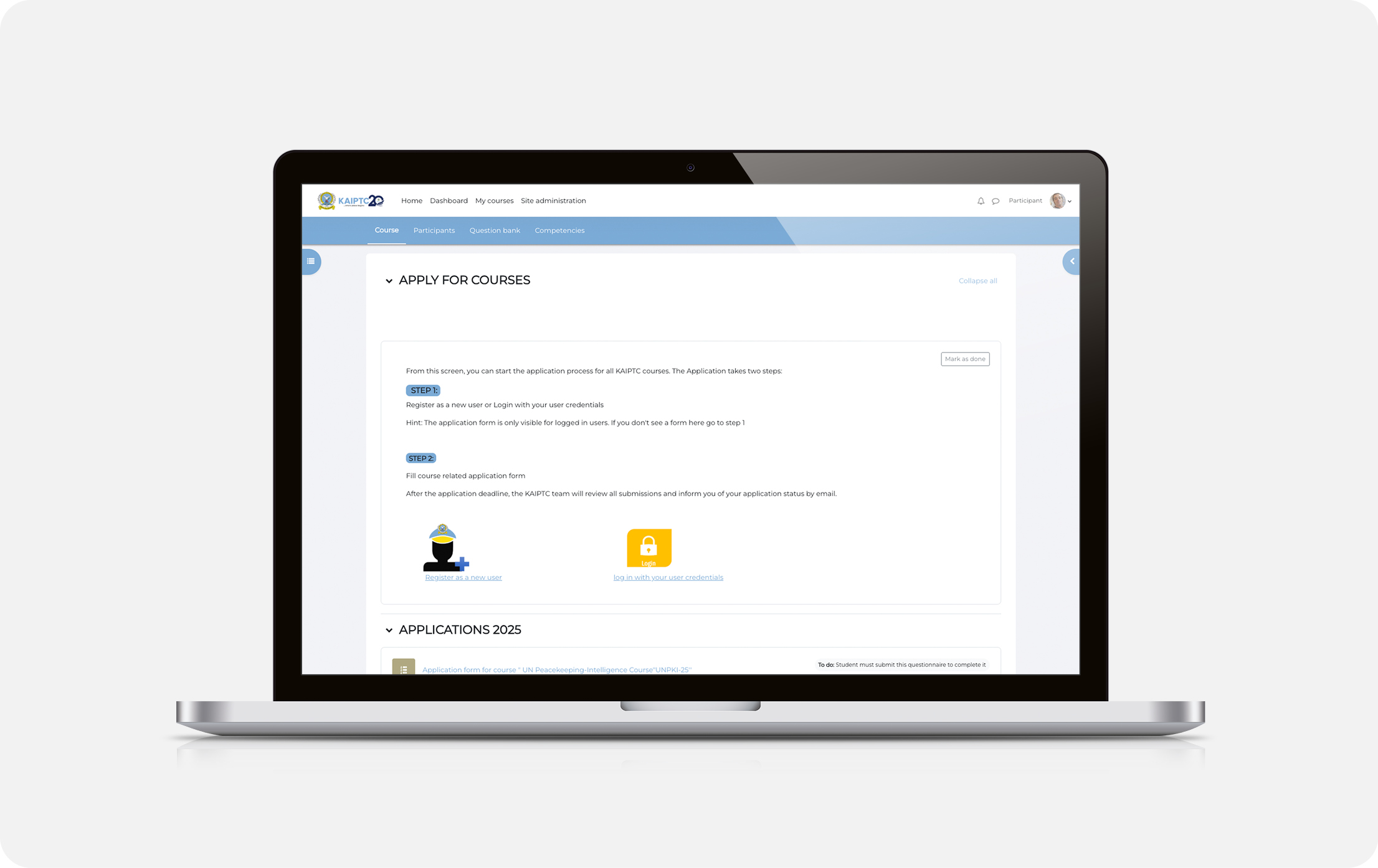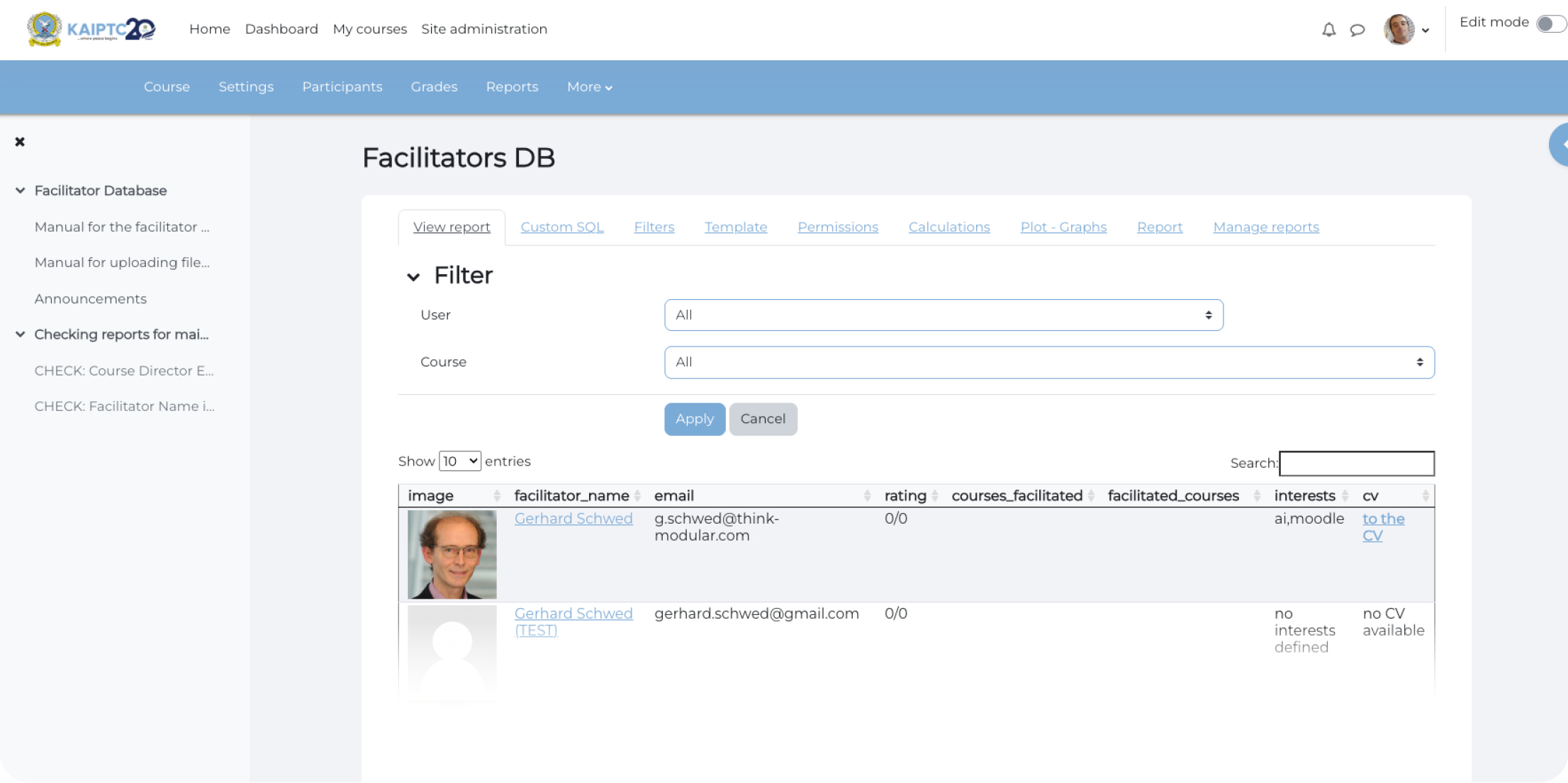KAIPTC uses Moodle as a central platform for both in-person and online peacekeeping training. In collaboration with think modular, a scalable solution was developed to manage the full application process, assign facilitators via a central database, and automate communication, feedback, and certification. Moodle now supports over 3,500 learners efficiently and sustainably.

In cooperation with Kofi Annan International Peacekeeping Training Centre (KAIPTC)
Project timeline Start in 2020 – ongoing
Project page lms.kaiptc.org
Our scope of work
Migrating and hosting the institutional LMS
The goal: establish a robust and scalable e-learning platform to serve a growing number of participants in both classroom-based and online formats.
The Kofi Annan International Peacekeeping Training Centre (KAIPTC) in Accra, Ghana, is a leading institution for training, research, and education in peace and security. It supports military, police, and civilian personnel through international programmes focused on conflict prevention, peacekeeping, and crisis response. To expand its digital learning capacity, KAIPTC partnered with think modular—digital solutions GmbH to implement and operate a sustainable learning management system based on Moodle.
Previously hosted locally on its campus, KAIPTC’s Moodle instance faced performance limitations due to unreliable connectivity and infrastructure. As demand increased and hybrid learning formats became essential, KAIPTC sought an experienced partner to ensure long-term reliability, further development, and institutional autonomy.

With a user base of over 3,500 active learners, the platform plays a central role in the delivery of high-impact training across the African continent and beyond.
KAIPTC uses Moodle not only for fully online programmes but also to support face-to-face training through blended learning. Beyond content delivery, Moodle now supports the entire application and enrolment process for KAIPTC’s courses. Interested participants can browse training opportunities, submit applications, upload supporting documents, and receive status updates—all within the platform. Once accepted, learners are automatically enrolled in the appropriate course environments, where they receive learning materials, schedules, updates, and certificates.
The platform also includes a centralized facilitator database, used to assign trainers to specific courses based on expertise, availability, and past involvement. In parallel, KAIPTC has introduced an alumni database within Moodle, allowing the institution to maintain contact with former participants, share follow-up materials, and invite them to future training or community engagement initiatives.
Additional automated processes streamline the learning experience: participants receive timely notifications about upcoming activities or deadlines; feedback is collected and analyzed automatically; and certificates are generated upon completion based on participation data. These features reduce administrative effort and improve consistency across programmes.
The focus: building internal capacity and ownership to remain agile, adaptable and impactful.
think modular facilitated a seamless migration of KAIPTC’s existing Moodle system and worked closely with the Centre’s IT team to ensure long-term sustainability. This included onboarding, training, and administrative enablement, empowering internal teams to manage users, courses, and processes independently. A key part of the collaboration was the development of customized workflows—such as extended feedback loops, participant communications, and training evaluation tools—tailored to the specific needs of peacekeeping education.
This focus on building internal capacity and ownership enables KAIPTC to remain agile, responsive, and in control of its digital learning ecosystem while benefiting from external expertise where needed.

A long-term collaboration for peacebuilding impact
The partnership between KAIPTC and think modular is built on shared values: accessibility, sustainability, and the transformative power of education. Through this collaboration, KAIPTC has strengthened its ability to deliver high-quality training programmes across geographic and technological boundaries. By combining open-source technology with reliable external support and deep institutional involvement, the project has created a resilient digital infrastructure that meets current needs and is ready to scale with future ambitions.
This case illustrates how digital partnerships can help institutions in the Global South overcome infrastructure barriers and position themselves as leaders in the international training landscape.
This project was a great success—from concept to completion. Collaborating with think modular was and has been seamless, and we’re extremely satisfied with the quality and precision of the final implementation.
Mr. Charlton Selorm Gbekle
Database and ERP Coordinator

